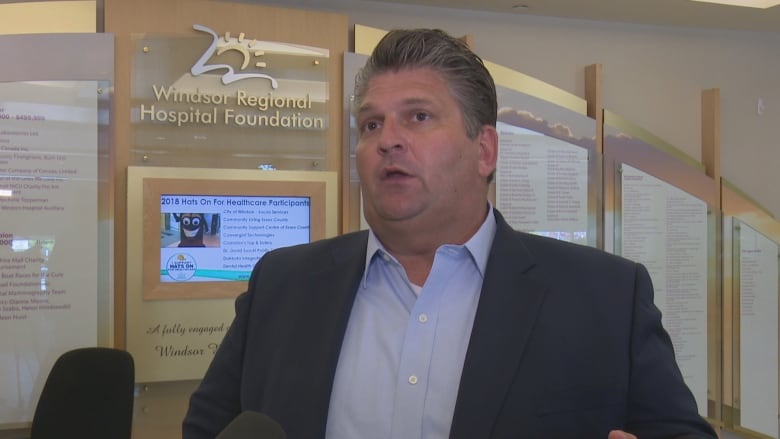Groups donate PPE to agri-sector as spectre of mandatory testing looms
Windsor Regional Hospital CEO says mandatory testing is 'way overdue'

Leaders in the region's healthcare, migrant worker and agriculture sector accepted a donation of 120,000 masks and face shields Monday as COVID-19 cases in migrant workers continue to rise and questions around mandatory testing continue.
The donations are meant for migrant workers and frontline healthcare workers caring for those in isolation, announced Windsor-Tecumseh Liberal MP Irek Kusmierczyk during a news conference Monday.
The equipment was supplied by volunteer-group Conquer COVID-19, which has been working to provide supplies to essential workers across Canada.
Six local community organizations — The Migrant Worker Community Program, Ontario Greenhouse Vegetable Growers, Windsor-Essex County Health Unit, Windsor Regional Hospital, Erie Shores Healthcare and Hôtel-Dieu Grace Healthcare — will distribute the equipment to workers.
"More than just PPE, today is about our community coming together, standing united to protect the most vulnerable amongst us, working to conquer COVID-19 to protect migrant workers and protect healthcare professionals," said Kusmierczyk, who helped co-ordinate the partnerships between the organizations involved.

But the PPE wasn't all that leaders were thinking about — testing is still top of mind, particularly after an announcement last week from Ontario Premier Doug Ford who said he had constitutional lawyers exploring the idea of mandatory testing.
Mandatory testing is something the federal government has also been looking at, Kusmierczyk said, adding that it is a complicated issue with no easy answer.
"It's an issue that we raised with our ministers and it's something that we are looking at," he said. "It's a complicated issue and to solve this issue, it's going to require an all hands on deck approach and it's going to require all of us coming at it with multiple angles."
Migrant worker advocate Jenna Hennebry told CBC News on Friday that imposing mandatory testing on one group could single them out and send a bad message.
"It can breed xenophobia. It can create conditions where people don't understand that the risk isn't necessarily from those people — that, in fact, those people are at risk," said Hennebry, who is an associate professor with the International Migration Research Centre at Wilfrid Laurier University and co-founder of the Migrant Worker Health Expert Working Group.
Farm owner Michael Del Ciancio of DC Farms said it's unfair for the government to enforce mandatory testing for the one sector, but that he understands why it has become an option.

"Farmers truly are doing their best and we are trying to work together," Del Ciancio said. "It's a complicated issue and it's going to take time to fix and it'll be small steps."
He said he doesn't think access to testing is the problem, instead it's getting workers to understand the situation and trust the government.
'Test everyone'
Windsor Regional Hospital CEO David Musyj said he fully supports mandatory testing and thinks it should have been done a while ago
"From my perspective, it's way overdue," Musyj said, adding that testing everyone is the only way the sector will be able to lower its COVID-19 case count.
"The longer you wait to go in and do any type of mandatory testing, it starts spreading [and] ... the problem is we're dealing here with a vulnerable sector."
In response to those who argue that mandatory testing singles out the sector, Musyj said that's all the more reason to "test everyone."

Due to an increased demand for testing, a second assessment centre at Windsor Regional Hospital was approved by Ontario Health and is expected to open in late August.
The second centre will be located at the hospital's Met campus, adjacent to the emergency department, in a temporary structure said the hospital in a news release.
The hospital's first centre, at its Ouellette campus, opened March 16. It set a record for testing on July 20 with 452 individuals.
In total, the centre has seen nearly 20,000 individuals since opening, according to the hospital.
Musyj said he expects demand to increase at the assessment centres as educational facilities open and people return back to work in the fall.